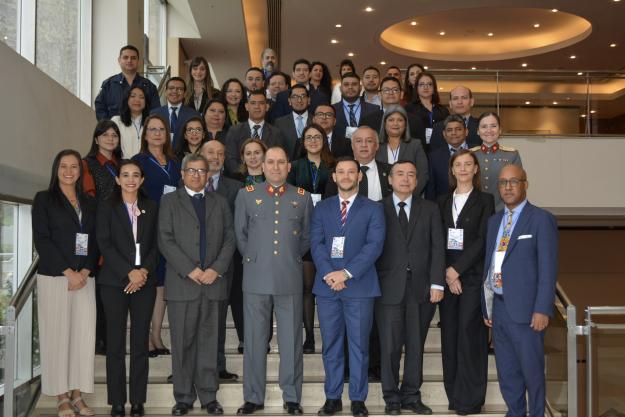
Participants of the OPCW’s Training of Trainers Course in Santiago, Chile.
The Organisation for the Prohibition of Chemical Weapons (OPCW), in collaboration with the National Authority of the Republic of Chile, successfully conducted a Training of Trainers Course for Representatives of Customs Training Institutions and National Authorities on the technical aspects of the Transfers Regime under the Chemical Weapons Convention. The event took place from 20 to 22 August 2024 in Santiago, Chile.
The three-day course was designed to strengthen the enforcement of the Convention’s Transfers Regime, contributing to both national security and global non-proliferation efforts. Participants were provided with the tools necessary to effectively incorporate the Transfers Regime into their national customs training programs. This included the development of essential methodologies and resources for creating Convention-specific training modules for frontline customs officers.
The course also focused on enhancing participants’ ability to design, implement, and evaluate training on the Transfers Regime’s technical elements. Additionally, it fostered greater collaboration between National Authorities and customs training institutions, ensuring the development and delivery of effective, Convention-compliant training courses for customs officers.
By equipping trainers with the expertise to share their knowledge, the program is expected to create a broader impact, extending its reach to a wider audience and ensuring long-term sustainability in the implementation of the Convention’s Transfers Regime.
Thirty-four participants from ten Latin American and Caribbean Member States took part in the event. Participating countries include Argentina, Colombia, Costa Rica, Chile, El Salvador, Guatemala, Honduras, Nicaragua, Paraguay, and Peru. The meeting benefited from the expertise of the participating Member States, the OPCW Technical Secretariat, and experts from various organizations, including the World Customs Organization, and the Inter-American Committee against Terrorism from the Organization of American States. These experts contributed crucial technical insights from their professional backgrounds to the discussions.
Background
The reporting of transfers of scheduled chemicals plays a vital role within the Verification Regime under the Chemical Weapons Convention.
The Technical Secretariat has continuously provided capacity building support to States Parties in the GRULAC region to help them implement the Chemical Weapons Convention and to address their CWC-related needs.
Article VII covers national implementation of the Convention and requires each State Party to enact implementing legislation at the national level. Comprehensive legislation at the national level is essential for preventing the re-emergence of chemical weapons.
As the implementing body for the Chemical Weapons Convention, the OPCW, with its 193 Member States, oversees the global endeavour to permanently eliminate chemical weapons. Since the Convention’s entry into force in 1997, it is the most successful disarmament treaty eliminating an entire class of weapons of mass destruction.
In 2023, the OPCW verified that all chemical weapons stockpiles declared by the 193 States Parties to the Chemical Weapons Convention since 1997 — totalling 72,304 metric tonnes of chemical agents — have been irreversibly destroyed under the OPCW’s strict verification regime.
For its extensive efforts in eliminating chemical weapons, the OPCW received the 2013 Nobel Peace Prize.
